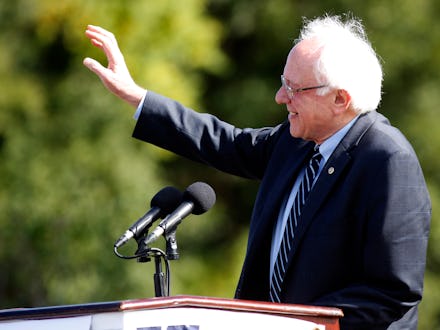Bernie Sanders Just Received One of His Biggest Endorsements Yet

Sen. Bernie Sanders (I-Vt.) won the backing Tuesday of the Working Families Party, a nationwide coalition of labor and progressive groups, delivering the senator one of his biggest endorsements to date in his quest to become the Democratic presidential nominee.
The endorsement followed a national membership vote, in which 87.4% backed Sanders, compared to 11.5% for former Secretary of State Hillary Clinton and 1.1% for former Gov. Martin O'Malley (D-Md.). Following the WFP's membership vote, the group's national advisory board voted to back Sanders' bid.
"Sanders is telling the truth about what's going in our society in a way that hardly any national politician has done in a very long time," WFP National Director Dan Cantor told Mic in a phone interview. "If you believe that the core issue of our time is inequality in all of its forms — racial, economic, environmental, social, gender inequality — then Sanders is a fairly obvious choice to drive this discussion forward."
Established in New York in 1998, the WFP has since established chapters in 10 states. Organizations allied with the WFP give the group a national supporter base in the "hundreds of thousands," its website states.
The endorsement: The Sanders endorsement marks the first time the WFP has endorsed a national campaign, although the group joined the effort this winter to draft progressive favorite Sen. Elizabeth Warren (D-Mass.) into the 2016 race. The effort to draft Warren closed shop in June, after she repeatedly disavowed interest in a White House bid. Sanders has since won over many of Warren's erstwhile backers with his summons to a "political revolution" against income inequality and what he routinely calls "the billionaire class."
"The Sanders campaign will be the first to tell you that they are both the recipient and the creator of this energetic moment. This goes back to Occupy [Wall Street] and the emergence of Elizabeth Warren," Cantor said, also noting the emergence of the Black Lives Matter movement. "There are social movements that weren't around even four of five years ago, so the energy one is feeling around the Sanders campaign is an expression of that. It's an amazingly youthful crowd that's going to these [Sanders campaign] events. That's tremendously promising and invigorating."
The WFP has not unveiled a detailed plan for marshaling support for Sanders, but Cantor said the organization would mobilize volunteers, contact voters and engage in turnout efforts in primary states.
While the democratic socialist's broadsides against big corporations and concentrated wealth have made his campaign a vehicle for progressives disillusioned with the United States' economic structure, Sanders struggled early on to connect with Black Lives Matter activists, whom WFP has helped organize. Supporters of the movement disrupted Sanders campaign events this summer, arguing that the senator's economic-centric message gave short shrift to the specific concerns plaguing people of color, including mass incarceration, police brutality and manifold forms of social and economic discrimination.
Sanders has since recalibrated his platform to emphasize criminal justice reform and alleviating racial inequality, and conceded to the New Yorker this fall that he "should have been more sensitive at the beginning of this campaign to talk about this issue." Cantor applauded that contrition, telling Mic that it showed a candidate who's "listening and learning."
"The door that Black Lives Matter has opened cannot be shut, and that's a good thing," Cantor said.
Polling shows that Sanders continues to struggle with African American voters, posing a significant hurdle to his bid to defeat former Secretary of State Hillary Clinton in the primaries. A CBS News/YouGov survey released last month found that Clinton led Sanders 72% to 25% in South Carolina, the third state to have its say in the nominating contest and where African Americans dominate the Democratic electorate. Clinton has also consolidated support elsewhere, moving into a clear lead in Iowa and holding Sanders to an effective tie in New Hampshire.
Cantor, however, argues that Sanders is no mere protest candidate. WFP's endorsement, he told Mic, is about "both moving the debate and winning the nomination and the presidency."
"When it's a debate about the issues that Sanders is talking about, our side wins. When it's a debate about the issues Republicans want to talk about, they win," he said.
One thing the endorsement is not, Cantor maintained, is a rejection of Clinton, who ran on the WFP line during her 2000 and 2006 campaigns for the U.S. Senate in New York.
"It's not some kind of reflection on her. It's a reflection on him that he has generated this kind of support," he said.